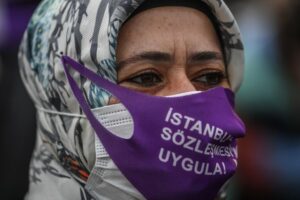
Turkey’s contentious withdrawal from a treaty combating gender-based violence has had a sympathetic response from at least one quarter: a top women’s group that includes President Recep Tayyip Erdoğan’s daughter.
With a stroke of the pen that sparked international outrage, Erdoğan last month pulled Turkey out of the 2011 Istanbul Convention, a landmark pact it once took pride in having helped craft.
Erdoğan’s decision came as the number of femicides and other crimes against Turkish women is growing. For some observers, the mostly Muslim but officially secular country now stands at a cultural crossroads.
Although Erdoğan gave no formal reason for his decision, a top aide said the treaty’s references to gender-based abuses had been “hijacked by people attempting to normalize homosexuality” — legal in Turkey since Ottoman times.
The LGBT movement was “incompatible” with Turkey’s “social and family values”, press aide Fahrettin Altun said in a statement.
This argument has found some support from the more religiously conservative women who often back Erdoğan and his ruling party, which is rooted in political Islam.
It has also resonated at Women and Democracy Association (KADEM), a group whose deputy chair is Erdoğan’s younger daughter Sümeyye.
‘Neither for nor against’
The convention’s association with LGBT activism “has become an unbearable burden for Turkish officials,” KADEM board member Derya Yanık told AFP.
“From our perspective, the Istanbul Convention was an instrument for combatting violence against women,” Yanık said during an interview at the group’s headquarters in Istanbul.
“But some groups tied the Istanbul Convention to (LGBT rights). It was one of the elements that eroded the charter.”
Officially, Yanık said KADEM was “neither for nor against” the convention, which requires countries to adopt a raft of legislation aimed at prosecuting perpetrators of gender-based violence and femicide.
But Turkey already has the required legislation in place, making its membership of the treaty less essential, she argued.
“There has been an argument made recently that if the Istanbul Convention is cancelled, there is no means or ways left for women to be protected against violence,” Yanık said.
“This is not the case.”
And she echoed Turkish officials’ claims that the treaty “imposed” the LGBT cause “as if it were a new normal”.
“We are not talking about homosexuality or fundamental rights and freedoms of homosexual individuals. Everyone is entitled to fundamental rights and freedoms in our constitution without any discrimination,” she said.
‘We are being murdered’
Condemned abroad, Erdoğan’s decree also sparked protests at home by women who feel increasingly threatened in the still largely patriarchal country of 83 million people.
More than 300 women were murdered in Turkey last year, according to the rights group We Will Stop Femicide Platform.
The World Health Organization found that 38 percent of the women in Turkey reported having been subjected to domestic abuse by their husband or partner.
The reported rate across Europe stood at 25 percent.

Aysel Özbey, 43, a headscarf-wearing woman who joined a protest rally in one of Istanbul’s more conservative neighborhoods, accused Erdoğan of staging “a coup against women.”
“When we are being murdered, we are not being discriminated against because of our language, religion, race; or because we are — or are not — conservative; or because we do or don’t wear a headscarf,” Özbey said.
‘No more lectures’
Rumeysa Çamdereli, a founding member of the Muslim feminist group Havle, scoffed at the suggestion that the convention somehow imposed LGBT lifestyles on Turkey.
“There’s an assumption that people will become homosexuals after reading the charter,” she said.
“This is not even something worthy of a response.
“We need legal protections and not lectures on values. We need specific laws and safeguards.”
Rights groups believe the courts largely ignore Turkey’s existing legal protections for women, creating a culture of impunity for abusive men.
Erdoğan’s decree had briefly sparked “a feeling of desperation”, said Çamdereli — before she realized that she had to go out and fight for her rights.
It was not the Istanbul Convention that posed a threat to traditional family values in Turkey, she insisted.
“It’s male violence, not the charter, that destroys families,” she said.
AFP
The post Exit from Istanbul Convention splits Turkey’s women’s rights activists appeared first on Turkish Minute.
from Turkish Minute https://www.turkishminute.com/2021/04/01/exit-from-istanbul-convention-splits-turkeys-womens-rights-activists/


Hiç yorum yok:
Yorum Gönder